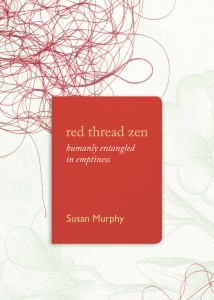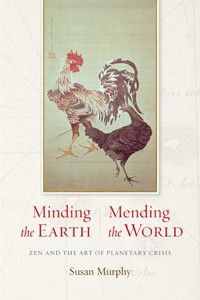Susan Murphy
Susan Murphy is the founding teacher of Zen Open Circle in Sydney, Australia and leads Sesshin training in Sydney and Melbourne. She is also a filmmaker and producer. Her first book was Upside–Down Zen, Finding the Marvelous in the Ordinary. She was authorized to teach by Ross Bolleter and John Tarrant, both dharma heirs to Robert Aitken of the Diamond Sangha branch of the Harada–Yasutani lineage.
Subscribe to our newsletter for news & events from Counterpoint Press.
Books
Red Thread Zen
Humanly Entangled in Emptiness
Love, attachment, the passions, gender, carnality, birth, bodily being, mortality, belonging, suffering, hope, despair, personhood, imagination, vitality, the struggle to be fully human – how do these things dwell wholly in emptiness, how do we reconcile their vivid life with 'no–thingness'?The red (or 'vermilion') thread originally connoted the color of the silk undergarments courtesans were obliged to wear. Most spiritual traditions do their best to distance themselves as thoroughly as possible from such direct and intimate contact with the fact of impassioned human bodily being, if not to declare open war upon the flesh, and the female body that most plainly bears flesh into the world. Spirituality has trouble dealing with the fact that we arrive here covered in blood.
But the red thread can never be cut. Why not? Why would no perfectly accomplished saint ever even dream of cutting it?
Red Thread Zen will set out to explore every corner of the magnificent koan of being 'still attached to the red thread, or 'line of tears'. This is an argument against the bloodless and socially disengaged form of 'Buddhism' that is generally being gestated in the West, one that shades too readily into the blandest of bland self–help.
Minding the Earth, Mending the World
Zen and the Art of Planetary Crisis
Shunryu Suzuki Roshi founded the San Francisco Zen Center in 1962, and after fifty years we have seen a fine group of Zen masters trained in the west take up the mantle and extend the practice of Zen in ways that might have been hard to imagine in those first early years. Susan Murphy, one of Robert Aitken's students and dharma heirs, is one of the finest in this group of young Zen teachers. She is also a fine writer, and following on the teaching of her Roshi she has engaged her spiritual work in the ordinary world, dealing with the practice of daily life and with the struggles of all beings.We know that our earth is in crisis, but is the situation beyond repair? Are we on a path of planetary disaster where the only proper response is to prepare for our melancholic dystopian future? Is there a way out of our suspicious cynicism?
In the tradition of Thomas Berry, using this spiritual opportunity to change the very nature of our crisis, Susan Murphy offers a profound message, subtly presented with clarity and assurance, showing that engaged Buddhism provides a possible path to the necessary repair and healing.

Catapult | Counterpoint | Soft Skull
1140 Broadway #706
New York, NY 10001
646.926.0805 | info@counterpointpress.com






